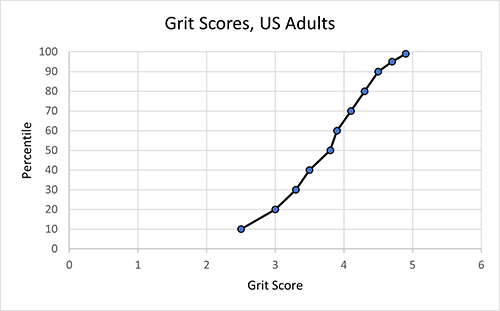
Improve your grit score
Frederick Scholl August 01, 2021

Frederick Scholl August 01, 2021

Whether you are pursuing a career in cybersecurity or other fields, a major indicator of your likely success is your personal grit. Duckworth’s book is not brand-new, but many people are reinventing themselves in a post-pandemic life. Hopefully, this blog and the book will be of value in that process.
I think that we all know that hard work is necessary to accomplish anything, but the ideas around “grit” go further to quantify what exactly this means and how you can benefit more from the hours you are putting in toward your career or other objectives. Are you just putting in long hours, or are you putting in productive hours? The concept of “grit” and Ms. Duckworth’s research aim to answer this question.
A psychologist by training, Angela Duckworth has spent years researching the indicators of success toward reaching goals. Many of the goals she studied have been related to careers in government, business, and non-profits. A key indicator she has highlighted is grit, the ability to hold a life goal for a long time. Your goal might be changing careers into cybersecurity. Or, if you are already a practitioner, aiming to move to the C-level job title.
Her theory of the importance of “grit” toward achieving goals is summarized by her two grit equations:
Skill = talent x effort
Achievement = skill x effort
Effort shows up twice in these equations! That is the significance of grit. It makes perfect sense once you think about it.
You can measure your grist score using Ms. Duckworth’s included score chart, reproduced here. For each question, select the descriptor that best describes you. You should have in mind some type of goal you are pursuing, such as career, or family, or education, etc.
The scores are 5 = Not at all like me, 4 = Not much like me, 3 = Somewhat like me, 2 = Mostly like me, 1 = Very much like me.
| Not at all like me | Not much like me | Somewhat like me | Mostly like me | Very much like me | |
| New ideas and projects sometimes distract me from previous ones. | 5 | 4 | 3 | 2 | 1 |
| Setbacks do not discourage me. I do not give up easily. | 1 | 2 | 3 | 4 | 5 |
| I often set a goal but later choose to pursue a different one. | 5 | 4 | 3 | 2 | 1 |
| I am a hard worker. | 1 | 2 | 3 | 4 | 5 |
| I have difficulty maintaining my focus on projects that take more than a few months to complete. | 5 | 4 | 3 | 2 | 1 |
| I finish whatever I begin. | 1 | 2 | 3 | 4 | 5 |
| My interests change from year to year. | 5 | 4 | 3 | 2 | 1 |
| I am diligent. I never give up. | 1 | 2 | 3 | 4 | 5 |
| I have been obsessed with a certain idea or project for a short time but later lost interest. | 1 | 2 | 3 | 4 | 5 |
| I have overcome setbacks to conquer an important challenge. | 1 | 2 | 3 | 4 | 5 |
After you calculate your average grit score you can see where you stand in comparison to the population of adults in the US. Half of the population is below 3.8 and half above. Where do you stand?

Now you most likely want to improve your score. What can be done? Dr. Duckworth identifies four pillars that make up grit: interest; practice; purpose; hope. Let us look at what these might mean for someone pursuing a cybersecurity career. First, interest—that is easy. But ‘cybersecurity’ is not specific enough. The NICE Workforce Framework defines 52 specific work roles1. We previously interviewed Diedre Diamond, whose company lists 45 cybersecurity job categories2. Should you start researching these to better define your interests? No. The better approach is to look to your network of classmates, professors, and other contacts to help define what your interest is in context. Your context. This is where having and developing a broad network of contacts is critical.
Next is practice. If you have read Malcolm Gladwell3, you know the formula that you need 10,000 hours of practice to be an expert violinist. Working full time, that is about 5 years, coincidentally the amount of experience needed for a CISSP security certification. But in cybersecurity you can change the scope of what you are trying to do. You just need to acquire enough skill in ONE area to distinguish yourself. The seven major areas we cover in our MS Cybersecurity degree include: risk, security technology, data security, software security, access control, cloud security and resilient systems operation. You might focus on one or two to launch your career journey.
Finding your purpose is key to maximizing the time you spend “practicing” or developing your craft. According to Dr. Duckworth, “purpose” means ‘the intention to contribute to the well-being of others’. The key to finding career purpose is to seek it in your network of contacts, professional and personal. Again, the power of networking.
The last step toward better grit is “hope”. Fortunately, the cybersecurity field is full of new opportunities for those who spend the time looking. Other fields and other times, not so much. Current data shows that the number of cybersecurity professionals needs to grow by 41% in the US to fill needs. I think needs will become even more urgent as processes and data become digitized and mobile.
My reading of Grit, the book, shows the power of networking and the critical importance of developing and using it to help attain goals. At least two of the components making up grit rest on this: finding purpose and defining your interest. For Quinnipiac's MS in Cybersecurity students, we offer a cohort of peers, a LinkedIn group, a skilled group of practitioner faculty and an active network of alums on Bobcat Connect, all ready to help you improve your grit and reach your goals. Learn how Quinnipiac University's online MS in Cybersecurity community can support your career goals throughout your program and beyond.
1www.niccs.cisa.gov (National Initiative for Cybersecurity Careers and Studies)
2www.cybersn.com
3Malcolm Gladwell, Outliers, 2011.
Quinnipiac Today is your source for what's happening throughout #BobcatNation. Sign up for our weekly email newsletter to be among the first to know about news, events and members of our Bobcat family who are making a positive difference in our world.
Sign Up Now